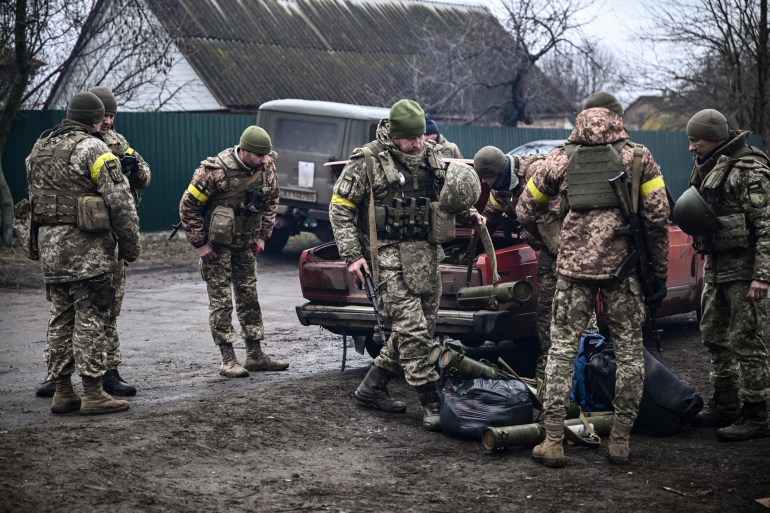‘Horrifying’: Yemeni students flee war in Ukraine | Russia-Ukraine war News
Beirut, Lebanon – When Abdullah* woke up to the sound of sirens at dawn in Ukraine’s capital Kyiv last week, and explosions rang out, it triggered distressing memories from the war in Yemen.
Russia launched a full-scale invasion of Ukraine on February 24.
“It was one of the most horrifying days of my life,” the medical student told Al Jazeera. “Other students living with me started to panic too.”
Abdullah and his flatmates are from Yemen, which for the past seven years has been rocked by a devastating war that has killed hundreds of thousands of people.
He left the Yemeni capital, Sanaa, for Kyiv in 2019 to earn his university degree and secure a safer future.
Now at a hostel in Warsaw, Poland, after an exhausting journey to flee Ukraine, Abdullah said the experience has left him shaken.
“It brought back some memories,” he said. “I wake up three or four times overnight feeling shocked and startled”.

Abdullah is among hundreds of Yemeni students caught up in the Russian war in Ukraine, according to Yemeni and international volunteers trying to evacuate them.
Yemeni students and nationals speaking to Al Jazeera asked to remain anonymous, fearing possible reprisals that may affect their legal status in Ukraine.
At least 227 civilians have been killed and 525 wounded in Ukraine, and at least one million people have fled the country, according to the UNHCR.
The UN refugee agency says it could be the “biggest refugee crisis this century”, and expressed its concern on Wednesday over the racial profiling of foreign nationals and students, especially those of African origin, at the borders.
So far, 65 Yemeni students have safely fled Ukraine, almost entirely through the Polish border with the help of a group of Yemeni and international volunteers called #YemenisInUkraine.
‘I didn’t know what to do’
Khaled*, a first-year engineering student in the northeastern Ukrainian city of Kharkiv, woke up at dawn to the sound of shelling in the distance.
“I didn’t know what to do,” he told Al Jazeera, recalling the shock and horror.
“In Yemen, during the war, you’re with family and in your own country. But here I didn’t know if I should stay inside, flee, or just leave my life up to God.”
He and 13 other Yemeni students took a bus across the country to the western city of Lviv before reaching the country’s border with Poland. The bus snaked through side roads to avoid traffic and the risk of shelling, and took some 26 hours to get close to the border.
“It was an expensive bus trip, and the heating was terrible. We were very cold,” Khaled said. “But these are exceptional circumstances.”
Before they could reach the border, they had to wait for another day amid the traffic as vehicles filled with people fleeing for their lives stretched for miles. At the border crossing, they waited anxiously for hours among a sea of people seeking safety. Khaled likened it to a jungle.
“The temperatures were three or five degrees [3-5C] below zero,” Khaled said, still exhausted. “We were burning cardboard boxes to stay warm.”
Among the foreign nationals they saw were from Syria, Palestine, Lebanon, India, and a host of countries from Africa.
“Everyone was in a state of panic,” Mohammad*, another Yemeni national who was at the border told Al Jazeera. “There was a lot of pushing and shoving.”
Some of the Yemeni nationals who spoke to Al Jazeera alleged discrimination at the border crossing.
“I made it through before my friends,” Khaled said, adding that Ukrainian nationals were prioritised.
“But after a group of people from India started complaining about why Ukrainian officers were holding them back from passing, they didn’t allow any foreign nationals to cross for several hours.”
He says his friends waited an additional 17 hours.
Khaled and his friends found some respite in Poland, where NGOs and volunteer groups provided them food, water, and even clothing.
“It was hard getting transportation to the capital because they prioritised families, children, and the elderly. We can’t really blame them for that,” he said.
Nowhere to go
The dozens of Yemenis who so far have safely reached Poland are trying to figure out what to do next. They are concerned that returning to Ukraine will not be possible anytime soon, and fear they would be sent back to Yemen.
“We want to complete our education and secure a future. Going back to Yemen isn’t an option,” Khaled said, his voice trembling.
“We hope to be able to stay somewhere with student visas instead of having to apply for refugee status. I don’t know, do I stay here, or do I go to Berlin?”
Reem Jarhum, one of the Yemeni organisers at #YemenisInUkraine, says they are trying to raise funds to help Yemenis secure transport from the border to Warsaw and accommodation.
“We have a transportation team in progress to sort that out,” Jarhum told Al Jazeera. “Among the biggest needs also include power banks and accommodation.”
Accommodation has been limited due to low budgets and short notice, some of the students told Al Jazeera.
“We’re moving from hostel to hostel,” Abdullah said.
Meanwhile, Mohammad said, many Yemenis were still trying to find a way to the border.
“Some have been waiting for the train all day, but it hasn’t arrived yet. It’s packed,” he said.
Jarhum said Yemeni students have alleged that Ukrainian train conductors did not let them on board, prioritising locals instead.
She and other volunteers continue to receive more calls from Yemenis asking for assistance in Ukraine.
“There are now families who are reaching out,” she said. “We just keep finding more people who need help. I don’t know when this is going to stop.”
*Name changed due to safety and residency concerns.




